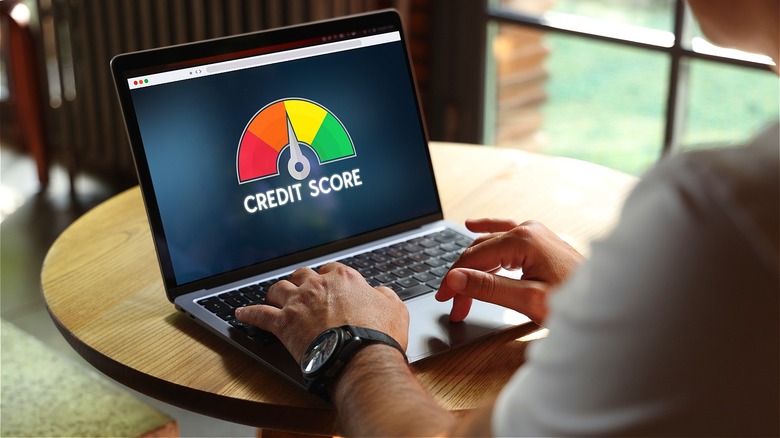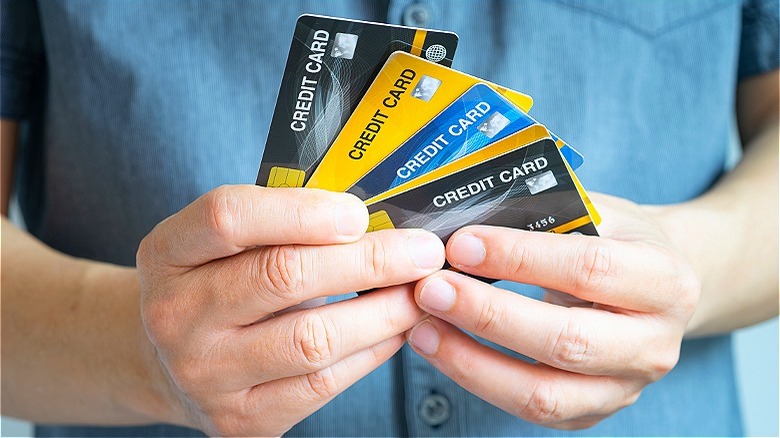Is There Really Such A Thing As Good Debt?
Some personal finance gurus like Dave Ramsey are of the opinion that all debt is bad. In fact, the host of the investing podcast "The Ramsey Show" goes so far as to say that debt is "a wrecking ball, both to your money and your mental health." However, at the risk of excessively picking on Dave Ramsey, Money Digest doesn't entirely agree with these opinions. Of course, not having any debt is ideal, but considering how expensive many important purchases have gotten lately, paying cash for everything just isn't a realistic financial goal anymore.
So what are some examples of debt that is worth taking on? If the borrowed funds improve your earnings potential, increase your net worth, or enhance your life, those can all be considered good reasons to take on debt. On the other hand, borrowing money to purchase rapidly depreciating assets or paying sky-high interest rates is definitely not a good idea. Those are examples of bad debt and when done to excess, can also drag down your credit score, which indicates to creditors how likely you are to pay a loan back on time. At the other extreme, good debt that's paid off on time can boost your credit score, making it consequently easier to qualify for loans, access lower interest rates, or even get a job.
Mortgages
Let's start with perhaps the most justifiable reason to get into debt: buying a house. Years ago, it was possible for a frugal citizen with a decent salary to purchase a house entirely with cash. However, the median price for a home in the United States nowadays is a whopping $431,000 (as of Q3 2023), per the Federal Reserve Bank of St. Louis. Therefore, it's no longer really realistic to expect most people or families to be able to save upward of $400,000 to pay cash for a house in a reasonable amount of time, especially with the high cost of modern living, saving for retirement, and other expenses. That means it's time to consider taking out a mortgage, which is a loan specifically for purchasing a home (apartment or other dwelling) — some of which have achievable modest downpayment requirements.
Home mortgages require paying interest to the lender in addition to the principal amount, which is indeed a drawback, but that's typically offset by several positives. For many families, for example, a mortgage payment can act as an automatic savings mechanism every month, with a good portion of the regular payments going toward reducing the mortgage balance. Also, the interest component of the loan may be deductible from personal income taxes in some instances. With all that said, perhaps the biggest benefit of buying a home versus renting is that real estate tends to appreciate over time, building wealth for the owner.
Student loans
For some folks, taking out student loans for an education can be a form of good debt. The interest rates on student loans are typically lower compared to other types of borrowing and may also be tax deductible. Of course, the end goal of student loans is that the education you're choosing to finance will lead to better career opportunities and a higher income throughout your working career.
That said, it's impossible to ignore the recent inability of some students to pay back their student loans, and their subsequent requests that the debt be forgiven. When taking out student loans, make sure the payback is worth it. For example, certain professions like doctors, lawyers, and engineers require a degree. Therefore, borrowing to achieve one of these careers is likely a savvy move. On the other hand, some liberal arts degrees might not have great earnings potential and therefore, aren't worth the high price paid.
Even if you've confirmed that a wisely chosen degree will improve your employment perspective, still try to minimize the amount of student loan debt you incur. A few tips to keep a lid on borrowing include starting your education at an affordable community college, then transferring those credits to a pricier four-year — though you should still resist the urge to attend the most expensive schools. Be sure to investigate other funding sources, too, like grants or scholarships and consider getting a side hustle to bring in some income. Finally, don't ever use student loan funds for "wants," like clothes, vacations, or electronic gadgets.
Business loans
Starting a small business could be a great way to hop off the treadmill of working for a thankless, faceless corporation. With a little planning and a good idea for a product or service, you can be your own boss, set your own schedule, and determine your own destiny, with the fruits of all your hard work going directly toward your own bottom line.
However, you might find that you need a small business loan or alternate source of financing to get your small business venture off the ground, and that's okay. Per small business attorneys Rounds & Sutter, LLP, securing capital early can be the key to a startup's success. "Proper financing from the outset can give the business the time it needs to grow and lay down roots, generating a customer base and revenue stream that will carry forward," explains Rounds & Sutter. "Trying to stretch minimal financing at the beginning is more likely to lead to the business failing to get off the ground while still incurring substantial debts that will need to be repaid."
Still, there are a few pitfalls to beware so that your small business loan continues to be good debt versus bad. First, steer clear of high-interest rates, like carrying a balance on a credit card outside of a promotional offer period. Also, make sure that funds secured with debt are going toward a good purpose, like increasing profit or growing the business. Further, resist the urge to lease expensive office space, hire too many employees early on, or travel unnecessarily.
Credit cards
Here at Money Digest, we're typically big fans of responsible credit card spending. For consumers with a modicum of self-control, using credit cards provides an automatic interest-free grace period of at least 30 days, and sometimes longer, to pay for purchases. Not to mention that reliably paying off your credit card balances will assist in building a rock-solid credit history and commensurate high credit score, which can come in handy for larger purchases, like a home. Additionally, many credit cards reward purchases with cash back or points that can be redeemed for travel. Other little-known credit card perks can include extended warranties, low-price guarantees, and travel insurance.
However, credit cards can also make it a little too easy to spend or, more accurately, overspend. If you're charging more purchases to a credit card than you can easily and consistently pay off when the statement arrives each month, that's bad news; any unpaid portion of your balance will be subject to interest charges. It's worth noting that credit card interest rates are among the very highest among any type of loan, approaching 25% APR on average. That means your latest splurge could literally take years to pay off. If you're in such a situation, try transferring existing balances to a new credit card with a lower promotional interest rate, and don't make that same overspending mistake again.
Auto loans
Much like home prices, buying a car has gotten a lot more expensive of late, especially during the COVID-19 pandemic. According to Kelley Blue Book, the average price of a new car in October of 2023 stood at $47,936. With luxury vehicles removed from calculation, the average price new car price drops to $44,331. Better, but that's still a challenging amount to squirrel away if paying cash.
Splurging on a brand-new car can be a bad idea for several reasons. Aside the fact that brand-new cars are expensive, interest rates on car loans in the U.S. have also risen dramatically as a byproduct of the Federal Reserve raising rates to fight inflation. If buying a new car is more of a want than a need, try to resist the urge and keep your existing good-condition car as long as possible. If you must replace your current car, consider buying a lightly used model, such as one recently returned after being leased.
Finally, research auto loan interest rates online before you begin to visit car dealerships to ensure they're offering you a competitive rate. Also, check out rates from credit unions you may be eligible to join, because their rates are frequently lower than other types of lenders. Finally, keep the auto loan term as short as you can afford to reduce the overall interest expense.





